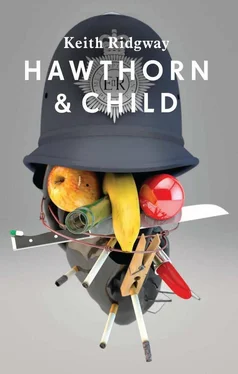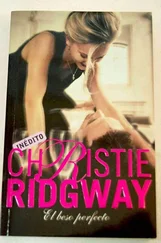— Detective Child?
His hands were large, but his grip was surprisingly gentle.
— No, actually.
I looked at him, confused. He seemed to blush.
— Child couldn’t make it. He asked me to come along instead. I’m Hawthorn.
— Oh.
— I hope that’s OK. I work with Child.
— I’m … I … Hawthorn?
— We’re the same rank, he said.
I stared at him. He looked like an idiot.
— Right. OK. I was expecting … Is Child black?
He tilted his head a fraction and paused. It annoyed me.
— Why?
We were still standing. I looked down at the table. It was the News of the World. His coffee cup was empty. Policemen love suspicion.
— Never mind. It doesn’t matter. I won’t keep you long.
— Did you specifically want to talk to a black officer?
— Specifically? No, not specifically. I suppose you’ll want a coffee. Is that coffee?
I stalked off to the counter. I don’t know why I was so annoyed. Specifically annoyed me. His not being Child annoyed me. The newspaper and the Red Bull annoyed me.
I bought him a second coffee, and a tea for myself. It cost a fortune.
— You’re a writer?
— Yes. A writer. Fiction. Not fact. Do you read?
He shrugged.
— I haven’t read any of yours I’m afraid.
— No. Well. No. Never mind. Why couldn’t Child make it?
He shrugged again.
— Some last minute thing. Family thing.
Right. He sat there stirring sugar into his coffee, a half smile on his face, his eyes sometimes drifting over the room, following people’s movements in some sort of police surveillance instinct. I took out a notebook and propped it up against the edge of the table so that he couldn’t read it.
I didn’t care, but I asked him what he did. What his duties were, how things were organized. The idiot had to think about some of it, correcting himself over the most basic things. I asked him how much he was paid and whether he was an alcoholic. He thought that was funny. I asked him whether he beat people up, lied, framed suspects, broke the law. His half smile stayed in place. His voice slowed a little sometimes, and he regarded me closely, as if I was a little interesting, but his politeness remained intact. Everything about him annoyed me more and more.
— People think you’re stupid.
— They do?
— Not you … specifically. Not necessarily. The police. The Met. Stupid, incompetent, dishonest, violent, crass, arrogant. Useless.
— Is that what you’re writing about?
I glanced at my notebook. Borough. C.I.D. Serious Crime Command. Death. Rape. Murder.
— No. I’m writing about terrorists.
— Ah.
— Were you around on 7/7?
He frowned. His smile disappeared. For a moment I had the horrible feeling that he was going to tell me that he’d been down in the tunnels. That he’d been first to the bus. That he’d held someone dying in his arms. That I knew nothing about anything.
— I was on leave, he muttered. Out of the country.
— My commiserations.
He scratched his nose, and the half smile returned.
— I’m writing about the Olympics. About a terrorist attack on the Olympics.
He nodded. He didn’t, to my fury, seem surprised.
— I’m not sure I can be much help with terrorism stuff.
— No. I know. I know that. I’m meeting with some anti-terrorist officers next week to discuss that side of things.
I barely even paused over my own lie. I have no idea where it came from. He glanced at me. Nodded again. A little hesitantly.
— I had been thinking of using you, or Child I suppose, or some other ’umble copper , as the basis of a character, my central character, my hero.
His half smile was infuriating. It hovered over his face indecisively, ready to fall one way or the other. It left all his options open, committed him to nothing, offered nothing, and waited for me to make another move. It was a police-helicopter smile.
— An ordinary policeman who stumbles over the plot, and who, against the odds, with no one listening to him, no one believing him, etc, becomes the hero of the story, stopping the bad guys at the last minute, saving the Olympics, saving London.
— Nice, he said, his expression unchanged.
Nice. He was mocking me. His face remained blandly polite. There was nothing you could point to in his voice or his demeanour or his eyes, but he was mocking me.
— But I don’t think I will, now, frankly. I can’t imagine you stopping anything very much.
The partial smile stayed where it was, but the head tilted a fraction, and something tensed across his shoulders, or his chest. His shirt seemed to snap to attention.
— Sorry to disappoint, he said quietly, levelly.
I had not spoken to anyone since Lloyd Page.
— We all love a hero, of course. But we all hate a hero too. You know? No one wants the bad guys to win, but everyone wants the bad guys to win. You know? You won’t understand. Policemen never understand. Policemen chase. Policemen arrive afterwards. You don’t have the choice. We have the choice. The rest of us have the choice. We decide when you get the call. We wait a little, see what happens. And as soon as you get the call, you don’t have a choice.
He just nodded.
— Every writer in London seems to be writing about the Olympics. I’m the first one you’ve met?
— Yes.
— Well, there’s a whole sleeper cell of thriller writers poking around the East End looking for ways to attack it, and looking for ways you can save it. What no one is doing though, what none of them seems able for …
I stopped and shut up. I looked at my hands.
I had realized what I wanted.
— I’m actually going to do it.
— You are?
His smile seemed to grow a little. I leaned forward.
— No one expects it, do they? Because although we enjoy these stories, as stories, and though we thrill to them, and enjoy the tease of death and destruction, it never actually comes home to us does it? It never happens. You lot get there in the end. You find the shooter, you shoot the shooter, you defuse the bomb, you capture the bomber, you drop him in the sea, whatever. Not any more. Not now. How gloriously liberating, for all of us, if this time, just this one time, you don’t stop him. No more teasing. Here’s the real thing. Billy fucking Flint, rushing to the stadium, driving through the shut down Olympic City, the opening ceremony under way, driving full pelt towards the stadium, finally knowing how it’s going to be done, knowing what’s at stake, rushing in his squad car. Imagine it’s you. Detective Hawthorn, rushing towards the Olympic Stadium, knowing that if you don’t get there in time thousands are going to die in the explosions. And worse, that millions more will be put in danger because you know, you’ve found out that not only is this a big fucking bomb, but it’s dirty too. It’s dirty as hell. And if it goes off, not only will East London not be regenerated, it will be uninhabitable for generations. From poison back to poison. London will die. You know. Only you know. Only you can stop it. And you’re driving there in your squad car, and your partner, Detective Child, he’s taken a bullet and he’s on the back seat, and he’s urging you on. He’s bleeding to death on the back seat, urging you to get there, to make it. And every book reader and cinema goer in the world, every Londoner, every human being on the planet, is enjoying the tension and the blood and the bang smash car chase, because they expect you to make it. They tell themselves they want you to make it, but the bad part of them doesn’t. And they’re enjoying that little frisson of badness, because they fully expect you to make it no matter what they want. Because that’s how it works. Except this time. Because this time I’m in charge. And I don’t want you to make it, Detective Hawthorn. I don’t want you to make it. So you don’t. You don’t fucking make it. You turn your car into Olympic fucking Way or whatever they’re going to call it, in what used to be the arse end of Stratford, and you’re surrounded by the manicured parks and the shiny Norman Foster venues and the flags and the lights and the great dumb glory of London all laid out for the world to see, with the stadium looming up ahead of you, glowing in the summer evening, and you’re looking at it, and Child is bleeding on the back seat urging you on, and you know you have to make it, for your kids, for the future, and you look at the stadium, and you’re looking at it, and there is a flash, and a crunch, and half of it seems to lean, to shift, and then it falls, the thing falls, and you see the whole thing come down, in a roaring rush of twisted concrete and steel, punched through with fire and dead bodies, thousands of dead bodies. There is blood falling on your car. You’ve failed. You have failed. You didn’t make it. They’re all dead. Child is dead. And the air is stabbed through with poison. You can’t breathe. But you have to breathe. So you breathe. All of London breathes. And London is dead. Because you didn’t make it. Because you failed. You.
Читать дальше












